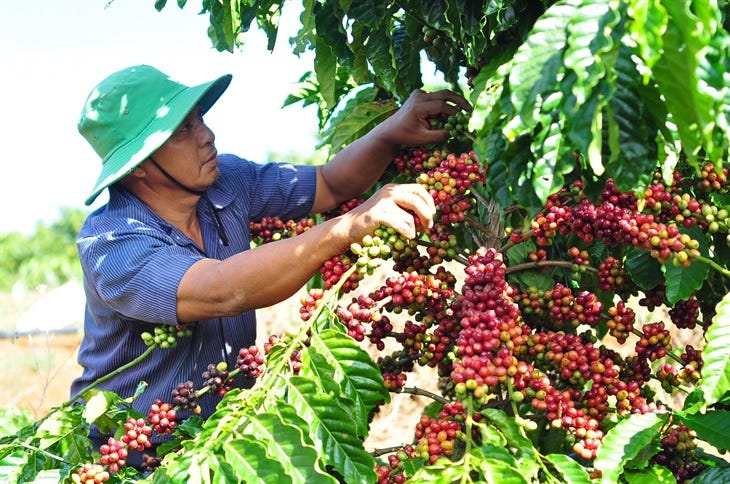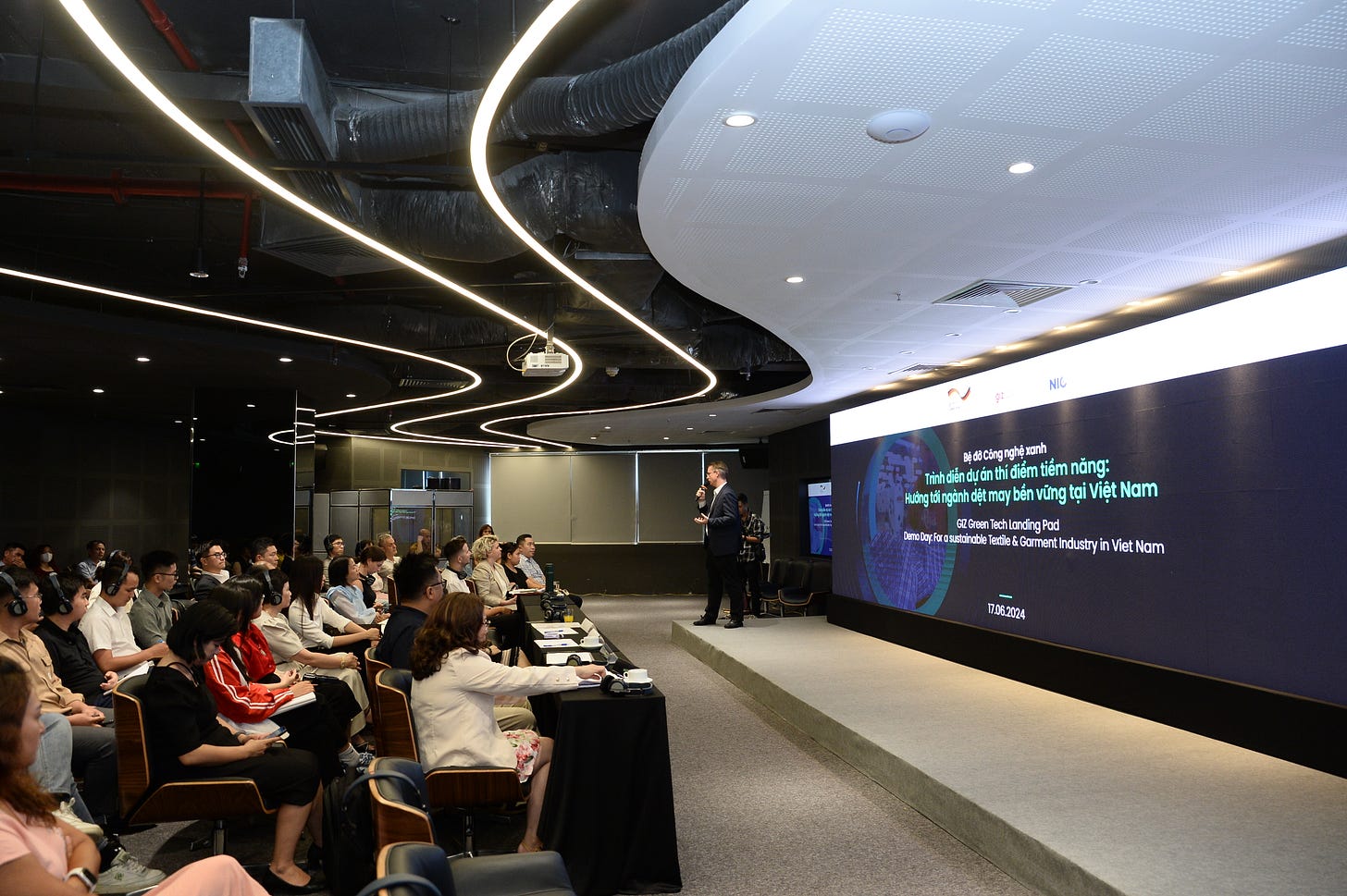Is the EU's agroforestry agenda just?
Welcome back to Clickable Insights. Today’s newsletter discusses the European Union’s increasingly consequential role in ASEAN’s agriculture sector, a new food loss climate tool from IFC, and Clickable Impact’s recent work in the agriculture and innovation spaces.
In other issues of Clickable Insights, you will find perspectives on sustainable tourism, private sector engagement for sustainable development, and green finance across Asia and the Pacific. Visit our Substack to read editions by the topics most important to you.
Photo credit: Hoang Le
Striking the balance – Trade policy, climate action and smallholder livelihoods
A new report on ASEAN’s food systems and sustainability by CropLife Asia and the EU-ASEAN Business Council examined the European bloc’s significant impact on agriculture across Southeast Asia.
The biggest impact will come from the EU Deforestation Regulation (EUDR). This regulation aims to prevent deforestation caused by trade policies and practices and directly impacts global agriculture supply chains.
Agriculture and land use account for around 20% of global greenhouse gas emissions, representing an enormous opportunity for reductions.
While the decarbonization aim of EUDR and similar policies is inarguably good, numerous developing countries fear this one-size-fits-all approach might not adequately consider their unique circumstances while potentially creating trade barriers for export-reliant countries.
The extensive due diligence and tracking-and-tracing requirements imposed by EUDR will impose substantial compliance costs on Southeast Asian farmers, as producers must submit certificates reporting greenhouse gas emissions during production. The EU also plans to establish a monitoring system, involving audits of goods-producing countries.
Indonesia and Malaysia, which account for 85% of palm oil production, have responded particularly sharply to EUDR. Both countries have filed World Trade Organization complaints against the EU, arguing that bans on palm oil imports violate international trade rules.
In 2023, one Indonesian government official went so far as to accuse the EU of ‘regulatory imperialism.’
Palm oil, which has driven widespread deforestation and land conversion in those two countries, will be among the most affected crops under EUDR, along with beef, cocoa, coffee, rubber, soy, and wood.
To quote the CropLife Asia report: “[This] approach may be a suitable policy framework for wealthy developed countries with high levels of technical and financial support for the agricultural sector, but a similar approach in developing countries poses clear risks.”
These risks include restricting access to agricultural innovation and ultimately reducing farming output in impacted countries, a reality that would hurt poverty alleviation efforts while harming food security.
Even the United States has urged the EU to consider delaying the policy until its issues are addressed. Meanwhile, the conservative European People’s Party, which performed well in recent bloc-wide parliamentary elections, wants to water the regulation down. Environmental policies have also sparked farmer protests across Europe, forcing European governments to make concessions while highlighting the tension between sustainability and food security/farmer livelihoods.
But despite concerns in both the Global North and the Global South, Reuters reported this week that the European Commission has no intention of delaying EUDR.
It should.
Specifically, the European Commission should consider how to harmonize EUDR enforcement in developing market with aid and agroforestry development programs.
Moreover, it should look to the significant role that positive incentives have played in the agricultural transition, including:
The voluntary carbon market, which incentivizes practices such as AWD rice farming (alternate wetting and drying), waste-to-biochar, and agroforestry/multi-cropping – though questions remain over how much these projects benefit smallholder farmers in absolute terms and in proportion to project developers.
Global GAP (Good Agricultural Practices) implementation in fruit and seafood production/
Positive incentives, rather than punitive measures that cut producers with limited resources out of major consumer markets, could be more effective than top-down regulations dictated from afar.
IFC Food Loss Climate Tool
Every year, nearly one-third of the food produced around the world is lost or wasted between farm and fork. This waste contributes to global hunger and is a significant driver of climate change.
The Food and Agriculture Organization estimates that reducing food loss would reduce GHG emissions by 14% by 2050 and feed up to 2 billion people.
A new tool from IFC, in partnership with the Carbon Trust and with support from the Global Agriculture and Food Security Program (GAFSP) and the government of the Netherlands, focuses on this issue in developing countries.
Through the Food Loss Climate Impact Tool, companies and individuals can identify ways to reduce food waste and strengthen the food supply chain.
The tool reports GHG emissions broken down by value chain phase, including transport, storage, processing, retail, and landfill; and estimates food loss rate, emission reductions, and the cost advantages of reducing food loss; and suggests the best interventions to reduce food loss.
It is the most comprehensive resource of its kind for emerging markets, measuring 50 crops and commodities in 117 countries.
These tools are becoming an essential part of sustainability frameworks for companies globally, especially those that export crops.
We’re excited to see such tools put in place for early-stage startups in the climate tech space, which often lack data to quantify their impact and are thus unable to access impact capital. These could present cost-saving shortcuts for such startups to scale their impact.
Weather-proofing Agriculture in the Mekong Delta Report
Clickable Impact consultants James Symons, Mai Vu, and Khanh Nguyen authored the ‘Weather-Proofing Agriculture in the Mekong Delta: Market Report’ published in May.
The report was commissioned by Hillridge Technology, an Australian insuretech company that has partnered with MSIG in Vietnam, and was officially launched at the Australian Consulate in HCMC.
Hillridge develops Weather Index insurance tools (also known as ‘parametric insurance’) to improve climate resilience for farmers in Vietnam against extreme weather, as well as using satellite data and other technologies to perform climate risk assessments.
After initially launching a drought insurance platform focused on coffee growers in June 2023, Hillridge and MSIG were awarded a grant under the Business Partnerships Platform, funded by the Australian Department of Foreign Affairs and Trade (DFAT). This program aims to support the development of further Weather Index Insurance tools tailored towards specific climate risks for key crops grown in the Mekong Delta.
The report’s main takeaways include:
The region produces over half of Vietnam’s rice and accounts for over a third of the domestic fruit sector and two-thirds of the aquaculture sector. Collectively, annual agriculture and aquaculture production is worth $16.1 billion.
$6.8 billion worth of this production could be affordably protected by effectively designed parametric insurance policies.
Of this $6.8 billion, less than 2% is currently covered by any type of insurance – this is the “Climate Protection Gap.”
Such insurance in the rice, shrimp, and fruits sector should focus on modern cooperatives, large-scale farming companies, and agricultural trading companies. To succeed, the climate insurance costs need to be shared by both the private sector and government actors to ensure widespread adoption by growers.
Overall, parametric insurance allows agricultural value chains to price in climate events that impact harvests. It is an important first step in pricing losses into the cost of a commodity so a crop can be more resilient.
The report launch received significant Vietnamese media coverage, illustrating the value of this research put together by the Clickable Impact innovation team. Natural Resources and Environment Newspaper, Women’s Newspaper, and Agriculture Newspaper covered the event, among others.
The launch complemented previous Hillridge partnership announcements for drought and typhoon insurance with MSIG and Bao Minh Insurance, respectively.
GIZ partners with Clickable to showcase green tech for the textile industry
GIZ partnered with Clickable on a demo day event that showcased five green tech pilot projects for the textile and garment industry in Vietnam.
The Green Tech Landing Pad Demo Day highlighted these projects in Hanoi as part of the Green Tech Landing Pad initiative, implemented by GIZ and the National Innovation Center under Vietnam’s Ministry of Planning and Investment.
Examples of the pilot technologies include: IoTeamVN's energy management solution, Enedig Kft's cloud-based labor cost calculation solution timeSSD®, Hoàng Hà's waste heat recovery solution, ECOSOI's pineapple fabrics and fibers, and BlockTexx's polyester and cellulose recycling solution.
Major domestic garment and textile corporations including VINATEX and Kyungbang responded positively to the demos, illustrating their potential for execution in this $50 billion industry.
IoTeamVN and Vinatex Nam Dinh Spinning Factory had the winning project and received further support to implement and scale up their pilot project. IoTeamVN will install and test-run their energy monitoring system at the factory. They estimate this could reduce electricity consumption by 1%.
By implementing the solution, the factory can save 1% of electricity consumption, equivalent to over USD10,000, and reduce 80 tons of CO2e.
The event attracted participants from 27 organizations, including key players from the governmental, development (USAID, INDE, GGGI), and academic sectors, alongside ecosystem builders (accelerators, VCs), solution providers, and prominent local textile companies (Vinatex, Faslink, and Thinh Phuc).
Thus far, the Green Tech Landing Pad has linked nine technological solution providers with seven textile and garment exporters.
Thanks to Clickable Impact consultants Ha Nguyen, Khanh Nguyen, Mai Vu, James Symons, Jason Lusk, and Mike Tatarski for contributing to this newsletter.
Back next month with more developments in climate action, transformative innovation, and sustainable tourism.
Clickable Insights is brought to you by Clickable Impact
Clickable Impact is an Asia-based consultancy committed to climate action and sustainable development. We have three practice areas: public affairs and communications, sustainable tourism, and transformative innovation. Across our work, Clickable Impact favors projects that urgently mobilize private sector engagement, policy action, and investment.
All views expressed in this newsletter are our own.
Copyright © 2024 Clickable Impact, All rights reserved. You are receiving this email because you opted in via our website.
Our mailing address is:
House 20A, 11/5 To Ngoc Van, Quang An, Tay Ho
Hanoi, Hanoi 11207
Vietnam







